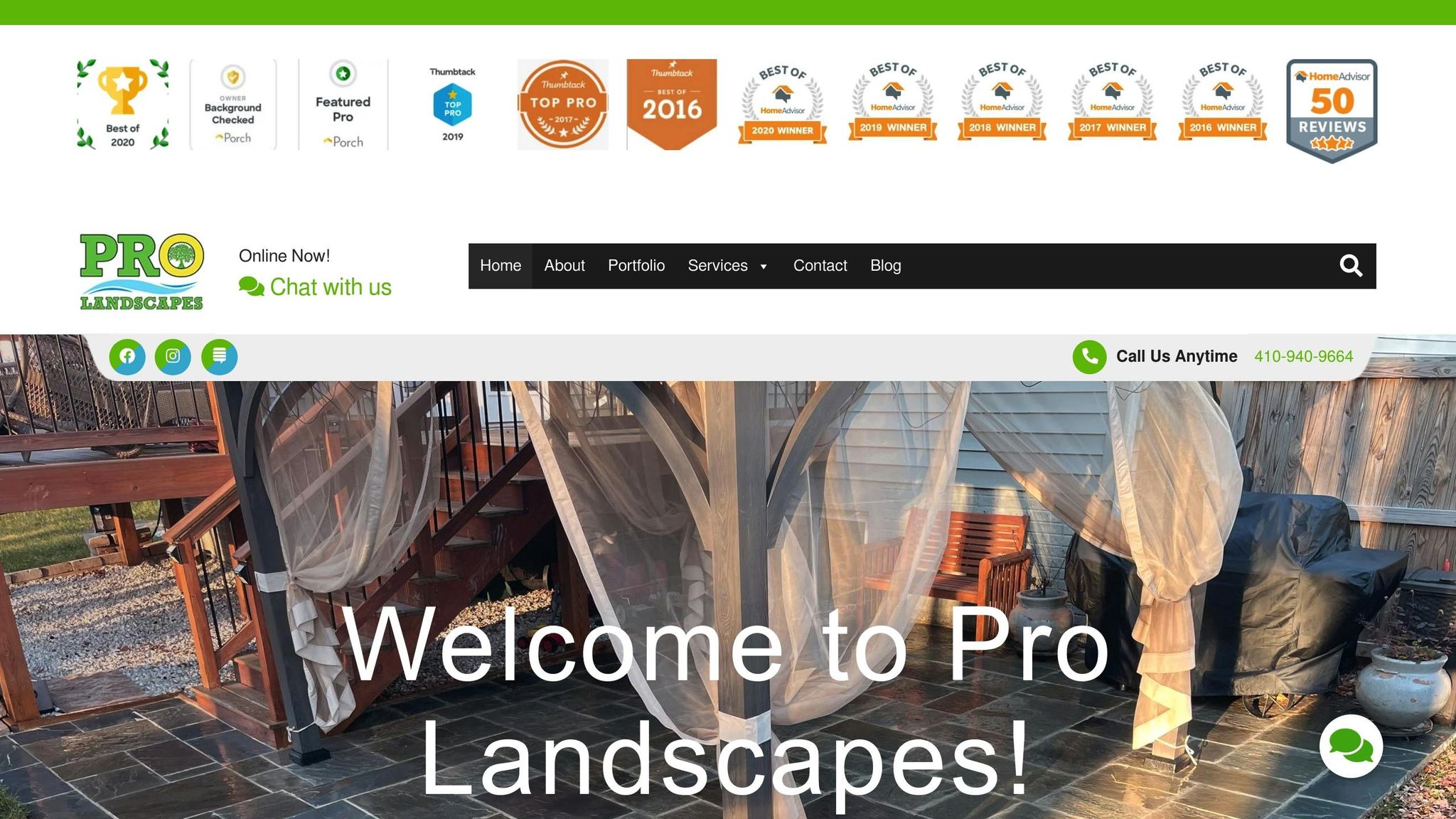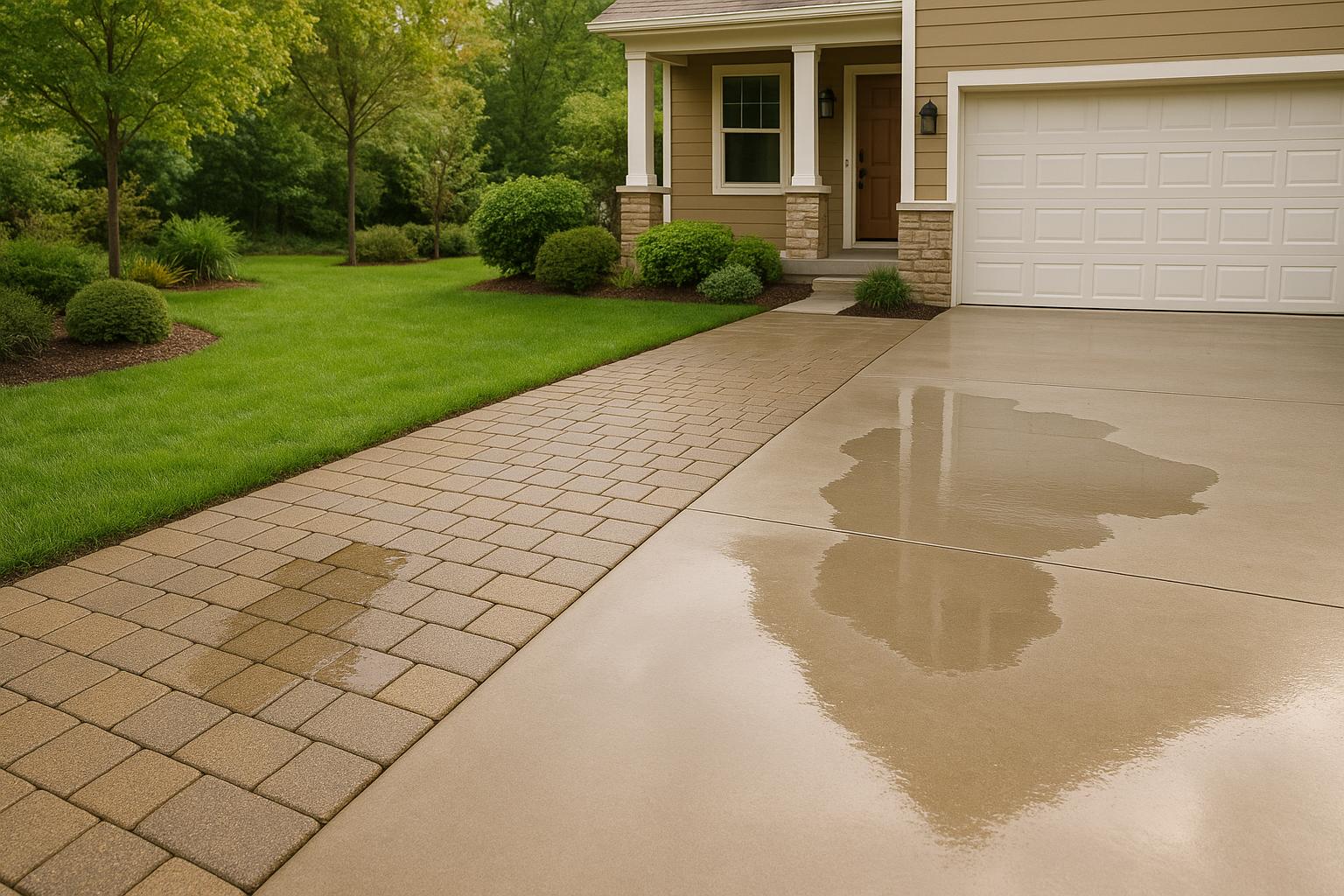- bhavya gada
- No Comments
Choosing between permeable pavers and concrete depends on durability, water management, and maintenance needs. Permeable pavers excel in handling rain, freeze-thaw cycles, and reducing runoff, making them a better choice for areas with heavy rainfall or strict stormwater regulations. Concrete, while strong and cost-effective initially, is prone to cracking over time and struggles with water drainage.
Key Takeaways:
- Permeable Pavers: Allow water to drain, resist cracking during freeze-thaw cycles, and support localized repairs.
- Concrete: Strong but rigid, prone to cracking, and contributes to runoff issues.
Quick Comparison:
| Feature | Permeable Pavers | Concrete |
|---|---|---|
| Durability | Flexible joints resist cracking | Prone to cracking in freeze-thaw cycles |
| Stormwater Management | Excellent – absorbs water | Poor – causes runoff |
| Maintenance | Easier, localized repairs | Repairs can be costly |
| Environmental Impact | Helps recharge groundwater, filters pollutants | Runoff carries pollutants to waterways |
If you’re in Maryland, where rain and freeze-thaw cycles are common, permeable pavers are often the smarter long-term investment.
Advantages of Using Porous Pavement vs Concrete or Asphalt with Brian Holers of Root Cause Seattle
Permeable Pavers: Features and Stormwater Management Benefits
Permeable pavers combine aesthetic charm with practical water management solutions. Unlike traditional solid surfaces, these pavers are designed with small gaps and porous materials that allow water to drain naturally.
A standard permeable paving system includes a porous surface laid over a base of open-graded stone and a sand drainage layer. When stormwater lands on the surface, it flows through these layers, which filter and absorb the water before it gradually seeps into the soil beneath[2][3]. This structure not only helps with water absorption but also significantly reduces surface runoff.
Stormwater Management Benefits
The benefits of permeable pavers have been widely recognized, especially in Maryland. Local governments in the state actively promote their use for stormwater management. For example, Montgomery County’s RainScapes program offers rebates to homeowners who replace traditional driveways with permeable pavement, providing step-by-step guidance through detailed manuals[2]. Similarly, Harford County has created "Permeable Pavement Design Guidelines" to encourage residents to reduce impervious surfaces[3].
Concrete: Strengths, Limitations, and Durability
In Maryland, concrete is a go-to material for driveways, walkways, and patios, largely because of its impressive compressive strength and ability to handle heavy loads. However, its non-porous nature presents challenges when it comes to managing stormwater. Here’s a closer look at its structural performance and issues with stormwater management.
Durability and Structural Considerations
Concrete’s solid and durable makeup makes it capable of withstanding significant wear and tear. However, its rigidity can be a drawback. It doesn’t adapt well to ground movement or environmental shifts, which can lead to surface cracks and gradual deterioration over time.
Stormwater Management Challenges
One of the main issues with concrete is its impermeability. Rainwater can’t seep through it, so it all runs off the surface instead[1][4]. This runoff can overwhelm local drainage systems, especially during heavy rains, putting extra pressure on municipal sewers[1]. On top of that, the lack of groundwater absorption means pollutants on the surface are swept directly into storm drains[1]. This creates additional environmental concerns by bypassing natural filtration processes.
sbb-itb-843f8be
Side-by-Side Comparison: Permeable Pavers vs. Concrete
When deciding between permeable pavers and concrete for your Maryland property, it’s important to assess how each performs in areas like stormwater management, freeze-thaw resistance, and environmental impact. These factors, combined with Maryland’s unique climate, can play a major role in determining which option will stand the test of time.
Comparison Table: Durability and Performance
| Feature | Permeable Pavers | Concrete |
|---|---|---|
| Stormwater Management | Excellent – allows rainwater to seep into the ground, aiding groundwater recharge | Poor – impermeable surface causes runoff, potentially overloading drainage systems |
| Freeze-Thaw Resistance | Superior – flexible joints reduce cracking during freeze-thaw cycles | Vulnerable – rigid surface is prone to cracking in freezing conditions |
| Environmental Impact | Positive – reduces runoff and filters out pollutants | Negative – runoff can carry pollutants, impacting local ecosystems |
Permeable pavers clearly stand out when it comes to handling stormwater, resisting freeze-thaw cycles, and offering an environmentally conscious choice compared to concrete.
Climate and Local Considerations
Maryland’s climate, with its cold winters, frequent freeze-thaw cycles, heavy rains, and humid summers, puts hardscaping materials to the test. Let’s take a closer look at how these materials perform under such conditions.
Winter Performance
In Maryland’s snowy winters, permeable pavers shine by allowing melted snow to drain through, reducing the risk of cracking caused by freeze-thaw cycles. Concrete, on the other hand, tends to trap moisture, which can freeze and expand, leading to cracks and long-term damage.
Stormwater Management
Heavy rainfall is common in Maryland, and permeable pavers excel by letting water infiltrate into the ground. This not only helps recharge groundwater but also reduces the risk of flooding. Concrete’s impermeable nature, however, often leads to water runoff, which can overwhelm drainage systems and contribute to localized flooding.
Soil Conditions
Maryland’s diverse soil types, ranging from clay-heavy to sandy, also influence how these materials perform. Permeable pavers are better suited to adapt to natural ground movement, minimizing damage risks. Concrete, with its rigid structure, is more susceptible to cracking under pressure from shifting soil, freeze-thaw cycles, and heavy use [1].
Additionally, permeable pavers help filter pollutants before they reach local water systems, making them an environmentally responsible choice – especially for properties near sensitive ecosystems like the Chesapeake Bay watershed [5][1].
Local Expertise: Pro Landscapes MD‘s Hardscaping Solutions

When it comes to hardscaping in Maryland, having local expertise is a game-changer. Pro Landscapes MD brings a deep understanding of the region, ensuring every project is tailored to meet the specific needs of Maryland homeowners. Their knowledge of local conditions allows them to deliver hardscaping solutions that are both durable and functional.
Custom Solutions for Maryland Properties
Pro Landscapes MD knows Maryland’s unique climate and environmental challenges inside and out. From accounting for local soil conditions to managing freeze-thaw cycles, they design paver installations that can handle the demands of central Maryland’s weather.
Beyond aesthetics, they tackle stormwater management with a range of solutions, including French drains, dry riverbeds, grading, and land leveling. This ensures that permeable paver installations work in harmony with your property’s natural drainage system – especially crucial for areas prone to heavy rainfall or stormwater issues.
Their expertise also extends to crafting paver patios, walkways, and driveways that are built to last, even in Maryland’s unpredictable weather. Plus, their familiarity with local building codes and stormwater regulations means every project is compliant, giving homeowners peace of mind.
Pro Landscapes MD goes the extra mile by tailoring site preparation to Maryland’s diverse soil types. Whether dealing with the clay-heavy soils of Montgomery County or sandier terrains elsewhere, they ensure that permeable pavers maintain their structural integrity and drainage performance over time.
And their commitment doesn’t stop at functionality – they’re equally invested in creating sustainable outdoor spaces.
Quality and Eco-Friendly Practices
For homeowners who value sustainability, Pro Landscapes MD is a standout choice. They specialize in environmental pavers and eco-conscious practices, aligning with Maryland’s increasing focus on green building and environmental stewardship.
Maryland’s location within the Chesapeake Bay watershed makes sustainability critical. Improper hardscaping can lead to runoff that carries pollutants like nitrogen and phosphorus into local waterways. Pro Landscapes MD addresses this by prioritizing permeable paving solutions that reduce stormwater runoff and minimize environmental harm [6].
Their use of green building materials not only enhances durability but also lowers maintenance needs, extending the lifespan of installations while reducing environmental impact [8]. For homeowners, this means fewer headaches and a smaller carbon footprint.
Choosing Pro Landscapes MD’s eco-friendly solutions can also lead to financial perks. Maryland’s Green Building Program offers potential tax incentives and rebates, and sustainable design elements can boost property resale values. Lower utility costs are another bonus for homeowners who adopt these environmentally conscious practices [7][8].
Conclusion: Choosing the Right Material for Your Hardscaping Project
Permeable pavers are a smart choice for Maryland’s challenging freeze-thaw cycles. They allow water to drain through, which helps prevent common issues like pitting, cracks, and holes – meaning less need for repairs over time [5].
These pavers also shine when it comes to managing stormwater. By stopping melted snow from refreezing into hazardous ice, they create safer walkways. Plus, they contribute to managing runoff in the Chesapeake Bay watershed, aligning with local stormwater regulations and Maryland’s environmental goals.
When comparing permeable pavers to concrete, the decision often comes down to durability and how well the material handles water management. Choosing the right material and ensuring proper installation are key to creating a long-lasting, functional hardscape. Pro Landscapes MD specializes in using high-quality materials and sustainable methods to build hardscapes that stand the test of time [9]. Ready to transform your outdoor space? Contact Pro Landscapes MD for a free consultation today.
FAQs
What are the long-term costs of choosing permeable pavers instead of concrete for a driveway or patio?
Permeable pavers come with a higher upfront cost, typically ranging between $10 and $30 per square foot, compared to concrete, which is priced at around $4 to $15 per square foot. While the initial expense is greater, permeable pavers bring long-term perks like improved drainage, reduced risk of flooding, and simpler repairs, which can make maintenance more affordable over time.
On the other hand, concrete is less expensive initially but may lead to higher costs down the line due to potential repairs or resurfacing – especially in areas where cracking or water damage is common. Although the initial investment in permeable pavers is steeper, their durability and ability to handle stormwater efficiently can make them a more cost-effective choice in the long term.
How do permeable pavers support sustainability in Maryland’s outdoor spaces?
Permeable pavers are an effective way to manage stormwater while promoting environmental health. By letting rainwater seep into the ground, they help reduce runoff, filter out pollutants, and recharge groundwater supplies. This not only prevents flooding but also improves the quality of water entering nearby streams and rivers.
In Maryland, where managing stormwater is a pressing concern, permeable pavers are particularly beneficial. They support eco-friendly initiatives by aiding groundwater replenishment and softening the impact of heavy rainfall. This makes them a smart option for anyone looking to design outdoor spaces with the environment in mind.
How does the maintenance of permeable pavers compare to concrete, and what impact does it have on their lifespan?
Permeable pavers need regular upkeep, like sweeping and the occasional pressure wash, to keep debris from clogging and to ensure water flows through as intended. When maintained properly, they can last 20-30 years, all while continuing to provide effective stormwater management.
Concrete, in contrast, requires less frequent maintenance but might need sealing and periodic crack repairs as it ages. Its typical lifespan ranges from 10-20 years, depending on environmental factors and how well it’s maintained. While permeable pavers demand more consistent care, their longevity and water management benefits make them a durable and eco-conscious choice with the right attention.


















Chat with Us